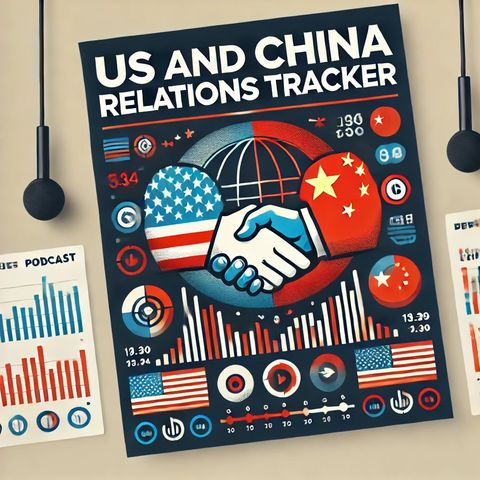Navigating the Shifting Geopolitics: How Iran-China-Russia Alignment Challenges US Hegemony

Download and listen anywhere
Download your favorite episodes and enjoy them, wherever you are! Sign up or log in now to access offline listening.
Navigating the Shifting Geopolitics: How Iran-China-Russia Alignment Challenges US Hegemony
This is an automatically generated transcript. Please note that complete accuracy is not guaranteed.
Description
The landscape of US-China relations is greatly influenced by shifting geopolitical dynamics and regional alliances. One notable factor is Iran’s approach to strengthening its ties with China and Russia. Abbas...
show moreThe focus on fostering stronger ties with China is particularly relevant given the current state of US-China relations, which are marked by both competition and cooperation. Beijing's Belt and Road Initiative (BRI) plays a significant role in this relationship, as China seeks to expand its influence through massive infrastructure projects globally. Iran, located on a crucial corridor of the BRI, benefits from this initiative, enhancing its connectivity and economic collaboration with China.
On the regional front, the growing Iran-China partnership also impacts the US’s strategic calculus in the Middle East. China’s influence in Iran could potentially counterbalance US efforts to isolate Tehran and curb its nuclear ambitions. This trilateral interplay is further complicated by China's need to navigate its own complex relationship with the United States, balancing economic cooperation with strategic rivalry.
Furthermore, the dynamic fares into comprehensive economic plans such as the 25-year cooperation agreement signed by Iran and China. This agreement promises vast economic, political, and military cooperation, potentially altering the power balance in the region and giving China a more fortified foothold in the Middle East. Such developments create a multifaceted dilemma for US foreign policy strategists who must consider economic sanctions, diplomatic isolation, and regional military alliances in response.
Russia's role as a mutual ally to both Iran and China also comes into sharper focus. With Russia and China often sharing a common stance in opposition to US policies, Iran's alignment with these two critical players could signal a united front on numerous geopolitical issues. This tripartite alliance might influence various global forums, including the United Nations, where decisions on sanctions, trade regulations, and security issues are contested.
In essence, the evolving cooperation between Iran, China, and Russia encapsulates a broader trend of countries seeking multipolarity in global governance, thereby challenging US unilateralism. As these nations intertwine their economic, political, and military interests, the US faces the necessity of recalibrating its approach. The intricacies of US-China relations are thus not merely bilateral but are deeply enmeshed with a larger, more complex geopolitical tapestry where regional alliances and strategic partnerships play a pivotal role.
In conclusion, the strengthening ties among Iran, China, and Russia underscore the layered and interconnected nature of modern international relations, particularly against the backdrop of US-China dynamics. As nations continue to forge alliances and redefine partnerships, the global balance of power is destined for continual evolution, compelling traditional powers like the US to adapt and respond to these emerging realities.
Information
| Author | QP-4 |
| Organization | William Corbin |
| Website | - |
| Tags |
Copyright 2024 - Spreaker Inc. an iHeartMedia Company
